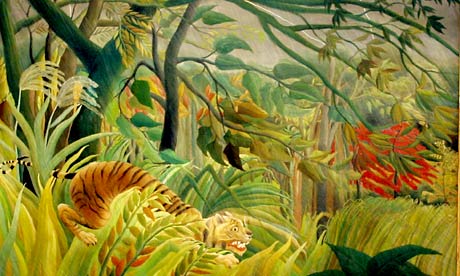The sixth extinction menaces the very foundations of culture
http://www.guardian.co.uk/environment/2012/sep/05/sixth-extinction-foundations-culture?intcmp=122

Henri Rousseau's Surprised!, 1891. Human culture would lose immeasurably from the disappearance of the tiger from the natural world. Photograph: Carl De Souza/AFP/Getty Images
In a cave in south-west France an extinct animal materialises out of the dark. Drawn in vigorous black lines by an artist in the ice age, a woolly mammoth shakes hairs that hide its face and vaunts slender tusks that reach almost to the ground.
Those tusks were not dangerous enough to save it. As human hunters advanced on its icy haunts, mammoths faced extinction between 4,000 and 10,000 years ago. The end of the ice age did for these shaggy cold-lovers, but humans helped: entire huts built from mammoth tusks and bones have been found.
We didn't mean to help make the mammoth extinct. The wonderful portrait of a mammoth in Pech Merle cave reveals that early homo sapiens was fascinated by these marvellous creatures. This masterpiece of cave art is as acute as any modern work of naturalist observation. The hunters who painted in caves showed the same passion for the natural world as their descendants do. Their culture must have been bereft when the mammoth vanished – even as they helped it on its way.
In the 21st century the same paradox endures. Human activity endangers entire species, yet human culture is profoundly rooted in nature. The loss of a species is also a loss of the images, stories, symbols and wonders that we live by – to call it a cultural loss may sound too cerebral: what we lose when we lose animals is the very meaning of life. Those first artists in ancient caves portrayed animals far more than they portrayed people. It was in the wild herds around them that the power of the cosmos and the mystery of existence seemed to be located.
